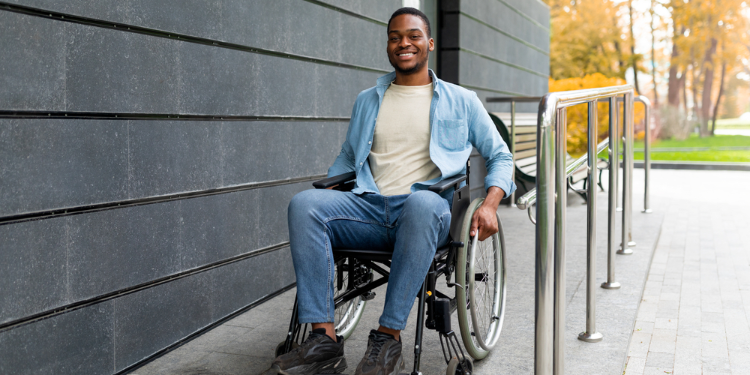
Moving abroad comes with an additional challenge when you have a disability. Some countries or even individual cities have better legal protection for the differently-abled, accessible buildings and public transport, and other things like accessible leisure and sports activities. They offer more welcoming environments for expats with disabilities to move to. Here are some of these destinations.
Canada
In recent years, Canada has passed many strong pieces of legislation to make the lives of differently-abled people easier. All Canadian public buildings are legally required to be wheelchair-accessible and have accessible toilet facilities. It must be noted, however, that the 2023 study “Mapping Our Cities for All” by Access Now has found that, despite this, many buildings remain only partly – rather than fully – accessible for the differently-abled.
The cities of Montreal (Quebec), Winnipeg (Manitoba) and Edmonton (Alberta) are often cited as some of the most accessible Canadian cities. Indeed, the last two cities have even received an Accessibility Cities Award from the Rick Hansen Foundation.
Canada also offers plenty of opportunities to differently-abled expats who love outdoor adventures. The Rick Hansen Foundation, as well as various other local websites (e.g., Destination Vancouver, Travel Alberta, BC Disability, etc), provide plenty of information about the activities available per region.
It must be noted that one drawback of Canada, however, is some level of discrimination against people with disabilities in immigration procedures. Some immigrant applications can be rejected if the applicant has a disability judged to put excessive pressure on public health services. The current threshold for ineligibility is over CA$26,220 in public healthcare expenses per year.
Spain
In Spain, almost all public infrastructure is accessible, even in historically cobblestoned areas. The country boasts of an extensive network of trains and ferries for domestic travel which are also accessible to the differently-abled.
The cosmopolitan city of Barcelona, a favorite of expats, stands out as an accessible Spanish city. Most cities have only fully accessible bus networks, but in Barcelona, the majority of metro stations also come with wide entrances, ramps and elevators.
It is a city with many attractions to visit, and all of these are accessible and even offer discounts to the differently-abled. For one, Barcelona's sunny beaches have wooden ramps for wheelchair access. The city's many attractions, even the older ones, are also accessible and even offer discounts to those with disabilities. Even the Montjuïc cable cars are accessible.
Besides Barcelona, other highly disability-friendly Spanish cities are the capital of Madrid, Valencia on the eastern coast and the Andalusian cities of Malaga and Granada.
Brazil
Brazil is one of the most disability-friendly destinations in South America. The sunny metropolis of Rio de Janeiro, in particular, stands out. Its public transport system is equipped with both lifts and tactile floors for the visually impaired. In Rio, all – rather than some – of the subway stations are accessible. There also exists a special taxi service called Especial Coop just for the differently-abled. Their taxis can accommodate wheelchairs, and they can be booked up to an hour in advance.
Like in Canada, the differently-abled can enjoy plenty of outdoor activities in Rio de Janeiro. Various parks, such as the Tijuca National Park, have accessible hiking trails with wheelchair ramps and plaques for the visually impaired. The base level of the iconic Christ the Redeemer Statue is accessible, and so are the panoramic viewpoints on top of the Sugar Loaf Mountain via cable car. Most museums around the city also have guides for those with special needs.
Who thinks “Rio '' thinks “beach,” right? Several famous beaches of the city, notably Ipanema and Leblon, have accessible entrances with ramps. Furthermore, the Rio-based NGO Adaptsurf has come up with Mobi-mats that can be unrolled on the beach to act as pathways. They also launched the initiative “Praia Para Todos” (“Beach for All”) in 2008 in collaboration with another NGO (NGO Espacio Novo Ser) to make various sports, from surfing to beach volleyball to diving, accessible to the differently-abled.
The United Arab Emirates
In recent years, the UAE has become one of the most disabled-friendly countries in the world. As the infrastructure there is very new and modern, it tends to come fully equipped with facilities for residents with special needs.
The Dubai Metro, for one, has lifts, ramps, tactile paths, braille signage and audible warnings in nearly all stations and trains. Many of these facilities were actually introduced in public infrastructure renovations last year as part of the “Abu Dhabi Comprehensive Strategy for People of Determination 2020-2024” plan. Multi-level parking spaces were also renovated to become accessible. There are also accessibility counters for those seeking advice or special equipment – including special smartphones.
“People of Determination”: this is the term that the UAE government has adopted since 2016 to talk about the differently-abled. They have had a very positive and proactive attitude about disabilities and have been coming up with many social development policies. State investment into education and therapy centers for the differently-abled, for one, has increased. Two of these centers are the Rashid Centre for People of Determination and Dubai NorthStart, the second of which facilitates the entry and integration of differently-abled workers into companies.



















